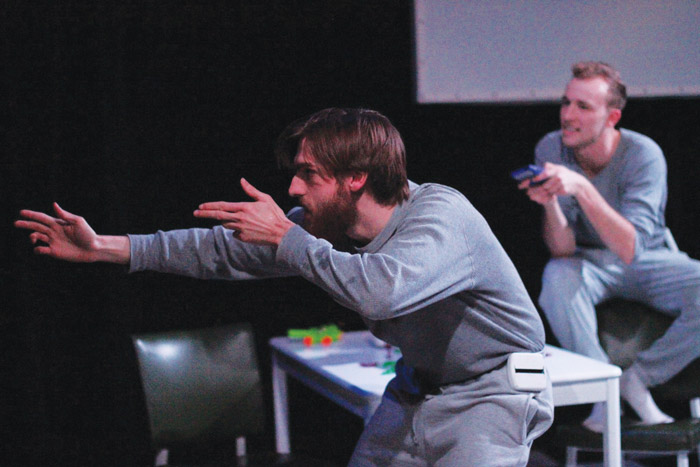In an age dominated by tweets and texts, it is quite easy to forget—or at least be distanced from—the chaos and warfare that ravages the world today. Kim Kardashian ‘breaks’ the Internet while Russia breaks international laws. Dresses change from white to blue on Facebook while the situation in Syria stagnates. ‘Tinderites’ incessantly strike out while U.S. drone strikes still affect countless families. Luckily, TNC’s latest production offers a great reality check.
Burning in Water, Drowning in Flame—the lovechild of 1984 and Brave New World—explores the moral, social, and physical complications that plague four war veterans in the year 2045, and is inspired by the work of author Charles Bukowski. By tracing the personal struggles of veterans prior to their military-induced reliance on “ephembrium,” a drug that erases the users’ memories and places them in a state of perpetual present, the play raises much needed awareness for the often-neglected struggles of war veterans, questioning the nature of a contemporary society that can ultimately lead people to surrender choice. Burning in Water, Drowning in Flame, due to an immersive, multi-media set, fantastic acting, and unique writing, ultimately shines and succeeds in generating much needed human empathy in a world that risks losing it.
Upon entering the theatre hall, the play immediately began to break down the gap between audience and actor. A lone actor was onstage to inhabit the veteran care facility while seats were still filling up, the house lights were on, and audience members were free to converse. This allowed director Ali Vanderkuyk to create a sense of inclusiveness with the audience that permeated the entire play. It felt like walking into a real care facility that operates independently of any audience.
Nicole Coon’s set arrangement also ensured that actors primarily entered and exited through the audience, thus creating a link between the actors—fictional war veterans of the future—and the viewers. Most notably, this immersion was cemented by the incorporation of a large projector screen into the set that often simulated the world beyond the confines of the care facility and even visualized text messages between characters. The set’s immersion, however, is so powerful that it slightly hindered the play by creating moments of awkward uncertainty on whether the acting was actually over. Regardless, the set design forced the audience into having an emotional stake in the play, and by extension, the human problems it tackles.
The production’s great set also houses wonderful actors. The fact that Ali Vanderkuyk wrote the script in conjunction with the cast is evident in how natural each line delivery felt. Ruthie Pytka-Jones’ (Lane) fidgety movements and masterful stuttering are downright hilarious, and, in particular, her close interactions with Jedidah Nabwangu (Haydee), who rarely raises her voice and speaks in closed body language, are impressive acting moments. Nicholas LePage (Marty) and Thoby King (Tate), with their eerie, hollow-eyed addresses to the audience and palpably deteriorating friendship brilliantly conveyed the alienation that permeates the human condition with or without warfare. Ruby Iacobelli (Lola), alongside the more temperate Claire Morse (Chloe), dominated the second act of the play with her assertive line delivery and booming voice.
The highlight of the play lies within the writing. Drawing directly from the works of Bukowski, Vanderkuyk weaves the author’s pervading themes of human isolation, alcoholism, and the frailty of human relationships seamlessly throughout the play. She then makes these themes more accessible to a modern audience through various pop culture references—Rock Band being my personal favorite—and a diverse set of characters that encompass core human archetypes.
A rare downside was the perhaps intentional gloom and doom of the first act, which dragged on far too long and created a stressful test of mental endurance before the second act. This aside, if you’re looking for an introduction into the lonely world of Bukowski, but with a modern and war-stricken setting that mirrors and addresses many aspects of today’s world, definitely check out /Burning In Water, Drowning In Flame/.
Burning In Water, Drowning In Flame runs from Wednesday, March 18 to Saturday, March 21 and from Wednesday, March 25 to Saturday, March 28. Performances are at 8 P.M. at Tuesday Night Café Theatre (3485 McTavish). Student/senior tickets are 6$ and adult tickets are 10$.








